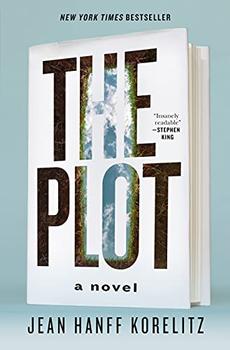Summary | Excerpt | Reviews | Beyond the Book | Readalikes | Genres & Themes | Author Bio

Critics' Opinion:
Readers' Opinion:
First Published:
May 2021, 336 pages
Paperback:
May 2022, 336 pages
 Book Reviewed by:
Book Reviewed by:
Peggy Kurkowski
Buy This Book
CHAPTER ONE
Anybody Can Be a Writer
Jacob Finch Bonner, the once promising author of the "New & Noteworthy" (The New York Times Book Review) novel The Invention of Wonder, let himself into the office he'd been assigned on the second floor of Richard Peng Hall, set his beat-up leather satchel on the barren desk, and looked around in something akin to despair. The office, his fourth home in Richard Peng Hall in as many years, was no great improvement on the earlier three, but at least it overlooked a vaguely collegiate walkway under trees from the window behind the desk, rather than the parking lot of years two and three or the dumpster of year one (when, ironically, he'd been much closer to the height of his literary fame, such as it was, and might conceivably have hoped for something nicer). The only thing in the room that signaled anything of an actual literary nature, that signaled anything of any warmth at all, was the beat-up satchel Jake used to transport his laptop and, on this particular day, the writing samples of his soon-to-arrive students, and this Jake had been carrying around for years. He'd acquired it at a flea market shortly before his first novel's publication with a certain writerly self-consciousness: acclaimed young novelist still carries the old leather bag he used throughout his years of struggle! Any residual hope of becoming that person now was long gone. And even if it wasn't there was no way to justify the expense of a new bag. Not any longer.
Richard Peng Hall was a 1960s addition to the Ripley campus, an unlovely construction of white cinder block behind the gymnasium and beside some dormitories slapped together for "coeds" when Ripley College began admitting women in the year 1966 (which, to its credit, had been ahead of the curve). Richard Peng had been an engineering student from Hong Kong, and though he probably owed more of his eventual wealth to the school he'd attended after Ripley College (namely MIT), that institution had declined to construct a Richard Peng Hall, at least for the size of donation he'd had in mind. The Ripley building's original purpose had been to accommodate the engineering program, and it still bore the distinct tang of a science building with its windowed lobby nobody ever sat in, its long, barren corridors, and that soul-killing cinder block. But when Ripley got rid of engineering in 2005 (got rid of all its science programs, actually, and all of its social science programs) and dedicated itself, in the words of its frantic board of supervisors, "to the study and practice of the arts and humanities in a world that increasingly undervalues and needs them," Richard Peng Hall was reassigned to the low-residency Master of Fine Arts Program in Fiction, Poetry, and Personal Non-Fiction (Memoir).
Thus had the writers come to Richard Peng Hall, on the campus of Ripley College, in this strange corner of northern Vermont, close enough to the fabled "Northeast Kingdom" to bear some trace of its distinct oddness (the area had been home to a small but hardy Christian cult since the 1970s) but not so far from Burlington and Hanover as to be completely in the back of beyond. Of course creative writing had been taught at the college since the 1950s, but never in any serious, let alone enterprising way. Things got added to the curriculum of every educational institution concerned with survival as the culture changed around it and as the students began, in their eternally student-y way, to make demands: women's studies, African-American studies, a computer center that actually acknowledged computers were, you know, a thing. But when Ripley underwent its great crisis in the late 1980s, and when the college took a sober, and deeply trepidatious look at what might be required for actual institutional survival, it was—surprise!—the creative writing that signaled the most optimistic way forward. And so it had launched its first (and, still, only) graduate program, the Ripley Symposia in Creative Writing, and over the following years the Symposia basically ate up the rest of the college until all that was left was its low-residency program, so much more accommodating for students who couldn't drop everything for a two-year MFA course. And shouldn't be expected to! Writing, according to Ripley's own glossy prospectus and highly enticing website, was not some elitist activity out of bounds to all but the fortunate few. Every single person had a unique voice and a story nobody else could tell. And anybody—especially with the guidance and support of the Ripley Symposia—could be a writer.
Excerpted from The Plot by Jean Korelitz. Copyright © 2021 by Jean Korelitz. Excerpted by permission of Celadon. All rights reserved. No part of this excerpt may be reproduced or reprinted without permission in writing from the publisher.





The Funeral Cryer by Wenyan Lu
Debut novelist Wenyan Lu brings us this witty yet profound story about one woman's midlife reawakening in contemporary rural China.
Your guide toexceptional books
BookBrowse seeks out and recommends the best in contemporary fiction and nonfiction—books that not only engage and entertain but also deepen our understanding of ourselves and the world around us.